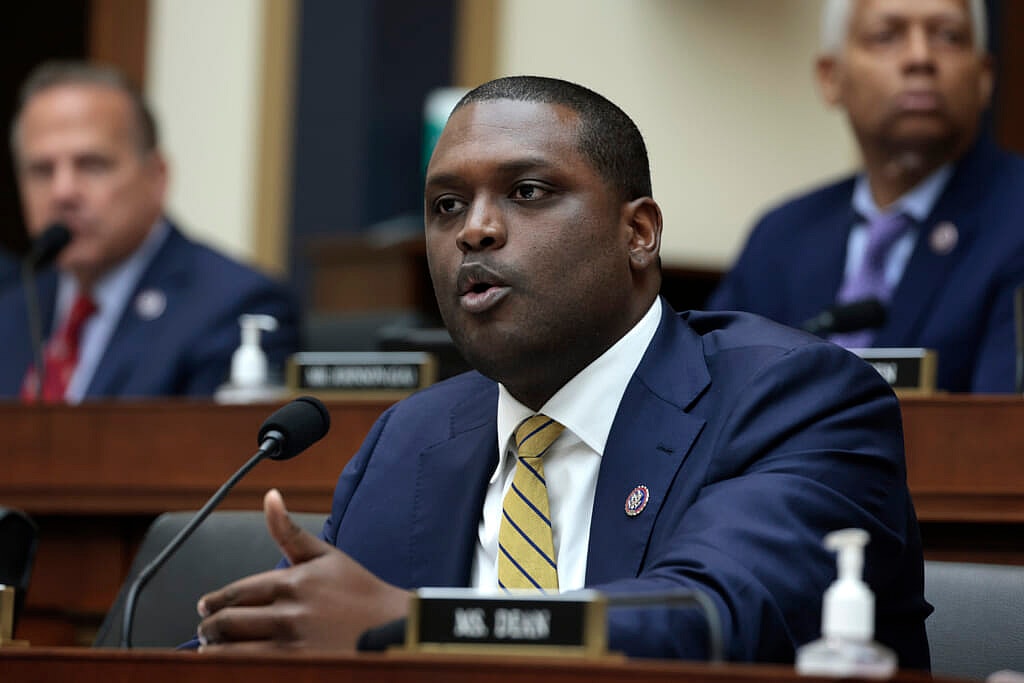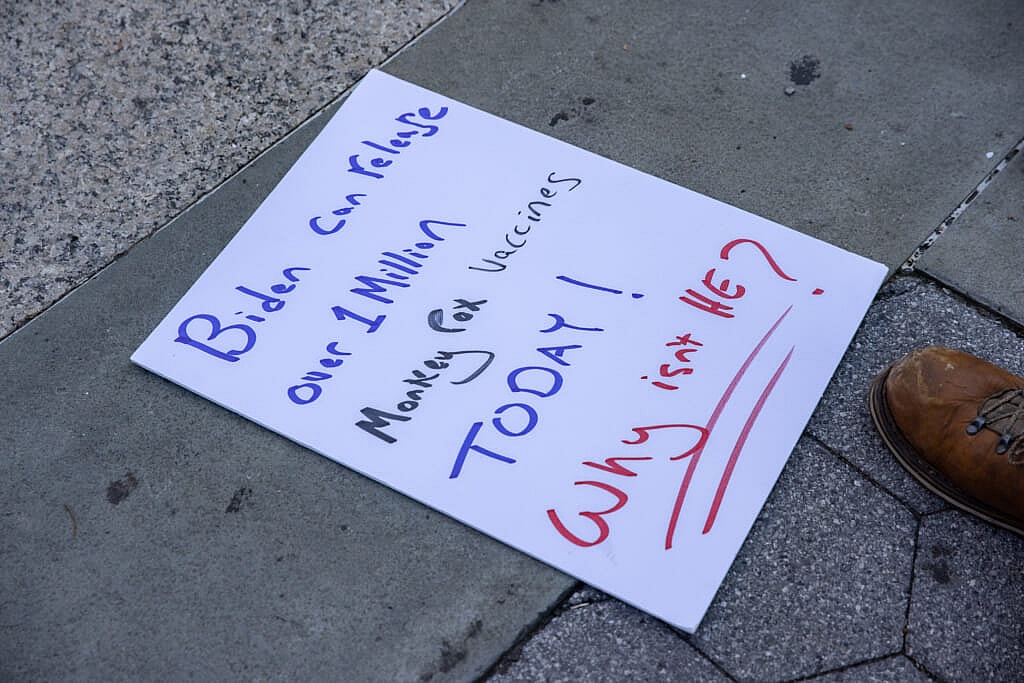LGBTQ+ advocates, elected officials and medical professionals are sounding the alarm over concerns they have about how the medical response to the monkeypox outbreak is stigmatizing the LGBTQ+ community.
Since the onset of the 2022 outbreak, the Centers for Disease Control and Prevention (CDC) and the World Health Organization (WHO) — which recently declared the rare infectious disease a public health emergency — have noted that cases of monkeypox are most prevalent among men who have sex with men, also referred to as “MSM” in the medical community.

But while scientists and doctors may be simply following and reporting the data, advocates say doing so could cause harm to gay, bisexual, trans, and non-binary people — suggesting that monkeypox is a disease that is exclusive to them.
U.S. Rep. Mondaire Jones, D-N.Y., told theGrio exclusively that he agrees with WHO that monkeypox is a global public health emergency that should be addressed before “the health and safety of our most vulnerable communities are further compromised.”
However, Jones, the first openly gay Black member of Congress, added, “I’m also concerned that stigma not be cast upon communities like mine — queer communities of color — given the intersectional discrimination we routinely face.”
Jones, who has used his seat in the U.S. Congress to call for equitable access to the HIV-prevention drug PrEP, said a lot can be learned from the “poorly” mishandled HIV/AIDS crisis in the 1980s and early 1990s.
“After the failed handling of the HIV/AIDS crisis, we vowed to never let government apathy endanger our community again — and if we don’t muster the will to take aggressive action, we will fail to meet that promise,” said the congressman.
While monkeypox is technically not a sexually transmitted infection (STI), the CDC and WHO noted that confirmed cases have been contracted mostly through sexual contact. However, the virus can also spread through touching contaminated clothing or linens, respiratory secretions when face-to-face for long periods of time, or simply close, intimate skin-to-skin contact such as hugging.
While health officials have frequently stated that those infected are largely made up of what CDC Director Rochelle Walensky characterized as the “men who have sex with men community,” LGBTQ+ advocates say framing the public messaging on the current state of the monkeypox outbreak needs to include a bit of nuance — or risk causing greater harm to an already vulnerable population.
WHO Director-General Tedra Adhanom Ghebreyesus, for example, advised “men who have sex with men” to reduce their number of sexual partners and practice safer sex, which could imply that all gay or bisexual men engage in risky sexual behavior — a longtime stereotype in the Black LGBTQ+ community.

David J. Johns, executive director of the National Black Justice Coalition (NBJC), a national civil rights organization that advocates for Black LGBTQ+ people, told theGrio that messaging from medical officials seemingly intended to protect at-risk communities, like Black gay and bisexual men, can actually cause greater harm. It’s not enough to simply follow the data, he said.
“Black same-gender-loving, queer gay men are more likely to be in a relationship with other Black men … it’s not that we engage in riskier behaviors,” said Johns. “We are more likely to be in communication with and to love one another, and then are least likely to have access to culturally competent and supportive medical practitioners or providers.”
Johns noted that medical data collection isn’t always intersectional or “interoperable,” adding that on a national level, “Black folks are always woefully neglected in the data collection and trials.”
Similarly, Kalvin Leveille, an award-winning HIV/AIDS advocate and public health professional in New York City, told theGrio that the current data on monkeypox “is not a representative sample.”
“Chances are this is an underrepresentation of what’s actually happening,” said Leveille. “So yes, the data that’s coming in so far, may be representing that [most cases are among men who have sex with men], but we don’t know. There are so many factors at play that can hinder communities from coming into a hospital to get tested.”

Other cases in the United States have included women, at least one of them pregnant, and two children.
Johns also highlighted that even the name monkeypox is stigmatizing and causes harm to Black LGBTQ+ communities by “uphold[ing] white supremacy, consciously or otherwise,” given the history of linking Black people to monkeys and apes.
“We’ve already seen media outlets and professionals in journalism talk about monkeypox and Black folks in ways that reignite and reify existing stereotypes,” he said. “All that does is discourage Black folks generally, and Black folks who are more likely to be susceptible … [and] avoid engaging with health professionals such that they can be tested and treated, if necessary.”
While the virus has more consistently been found in Africa over the years, particularly in Nigeria, advocates and some scientists have scoffed at the name monkeypox as it suggests that it is exclusively an African disease. In June, the WHO director-general called an emergency meeting to discuss the organization potentially changing the name, however, no announcement has been made.
Johns told theGrio that NBJC is encouraging the public to instead refer to monkeypox by its acronym, MPV.
It appears the Biden administration is heeding the warnings of LGBTQ+ advocates and health professionals and taking a more cautious approach to its messaging and handling of the MPV outbreak.
During a White House press briefing this week, COVID-19 response coordinator Ashish Jha told reporters that the administration was working with the LGBTQ+ community “to ensure that we are getting out good information, that we are addressing concerns that they have [and] we are listening to their concerns.”

He added, “We’ve been deeply engaged with them, both to share information, also to learn more and make sure that everybody is communicating in a way that’s both scientifically accurate and respectful.”
When asked during another press briefing this week about who should be getting vaccinated for MPV, White House press secretary Karine Jean-Pierre refrained from repeating previous guidance that men who have sex with men should be prioritized for vaccines. Instead, she advised those who have concerns about the virus to consult their medical provider or a local health agency.
After facing a vaccine supply issue in the U.S., the Food and Drug Administration (FDA) on Thursday announced that it has cleared nearly 800,000 new doses. However, there remains a concern about whether that will be enough to meet the demand.

Jones, who noted that his state of New York has become an outbreak hotspot, said there is “increasing difficulty accessing vaccine appointments — whether it be because of high demand, the lack of vaccine supply, or both.” The congressman is calling for President Joe Biden to declare the crisis a public health emergency and “mobilize the full force of the federal government to protect our queer communities around the country.”
Johns, of the justice coalition, was more ambivalent about whether a public health emergency should be declared. “There are some benefits and there are some challenges, as is often the case in the policymaking process,” he told theGrio.
Noting that WHO declared a global health emergency that allows “for there to be coordinated strategic investment in responding to MPV,” Johns said doing so on the national level would permit the Biden administration to “have access to some additional resources or additional levers.”
However, there are also political realities, in which Republican-controlled legislatures or governorships could challenge the administration “simply because of the use of executive authority,” said Johns. To be more foolproof, he said, “it’s possible for this administration to continue to try and pursue these kinds of strategies” without a public health emergency.
Leveille, who has been a public health professional for 15 years, said ultimately the current MPV outbreak, particularly in the LGBTQ+ community, could have been avoided if public health leaders and governments saw the importance of investing more in public health concerns not just nationally, but globally.
“Had we really truly invested resources and ensured that we monitored [MPV], as well as other health concerns in other countries, we probably would not be in this situation,” said Leveille. “We would have been more prepared, instead of stockpiling vaccines in case of a biomedical war.”

Gerren Keith Gaynor is the Managing Editor of Politics and Washington Correspondent at theGrio. He is based in Washington, D.C.
TheGrio is FREE on your TV via Apple TV, Amazon Fire, Roku and Android TV. Also, please download theGrio mobile apps today!

